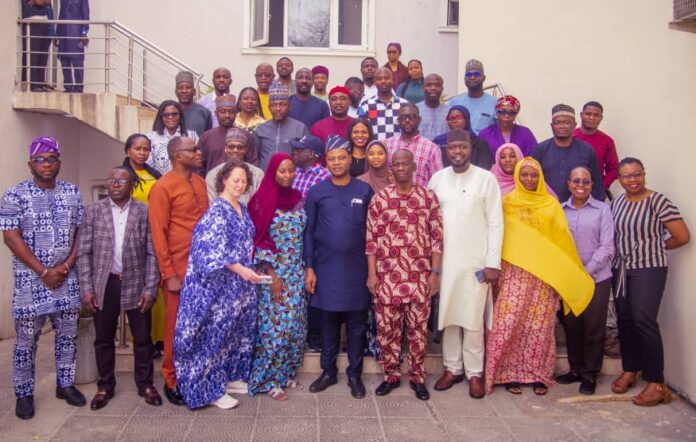By Rabiu Sanusi
The Primary Health Care Management in Nigeria has been marred by a number of challenges, which has over the years stunted the growth of health care services at the community level, despite its importance to the health and wellbeing of the people.
The challenges include among many others, inadequate funding, poor staffing, infrastructure deficit, equipment, training and the lack of political will to implement approved health policies.
As part of responsibilities in the exclusive list designed to be managed by the State Governments, the Federal Government had limited control over Primary Health Care Management at the lower federating units across the country.
Also in a determined effort to revitalize Nigeria’s health sector, the Federal Ministry of Health (FMOH), under the leadership of the Coordinating Minister of Health and Social Welfare, Prof. Muhammad Ali Pate came up with a policy to incentivize the growth of Primary Health Care in Nigeria through the World Bank supported HOPE-PHC Program.
By effectively implement this policy, the ministry organized a three days Stakeholders Engagement Meeting in Kano State, featuring experts and stakeholders from the medical field.
The event was aimed at finalizing the Project Operational Manual (POM) for the World Bank-supported HOPE Project, a $570 million initiative designed to improve health service delivery, boost healthcare facility readiness, and enhance the resilience of the health sector.
Speaking, Dr. Ashiru Adamu Abubakar, Governance, Coordination, and Subnational Engagement Lead at the SWAP Coordination Office, underscored the significance of the POM.
“Nigeria’s health sector faces challenges, from financing to fragmentation. The HOPE Project offers a transformative approach by pooling resources to incentivize impactful actions across the healthcare value chain.
“We have ensured that all voices are heard. This collective leadership is key to achieving our goals.
Dr. Adamu highlighted the compact signed between the federal government, state governments, and development partners to ensure collective action toward common health goals.
The HOPE Project seeks to address critical issues such as poor health outcomes despite substantial spending, inadequate emergency preparedness, and a lack of sustainable operational frameworks.
The initiative will focus on digital transformation, emergency medical services, and improving access to primary healthcare.
On his part, Dr. Shola Akande, Chief Executive officer Oyo State Health Insurance Agency
said the aim of the three days review of the Operation Manual is to ensure that the document is transparent, free from all ambiguities, hence making it easy to understand for all.
“The project is designed to not only holding officials and public health authorities accountable but to also reward performance, to reward excellence in discharging assigned responsibilities as well as to reward basic expected deliverables.”
Expressing his optimism over the World Bank assisted project, Dr. Bisola reaffirmed that it is not going to be business as usual, noting that beneficiaries will have to work hard for the funds.
The event saw participation from a cross-section of stakeholders, including representatives from state health ministries, primary healthcare boards, health insurance agencies, development partners, and federal health institutions.
Participants expressed optimism about the document’s potential.
Dr. Emu Rendobra, Head of Operations for the National Emergency Medical Service and Ambulance System, lauded the POM for its emphasis on primary healthcare and emergency medical transport.
“This document is an opportunity to address the abysmal health indices by investing in primary healthcare centers,” he noted.
Dr. Evaristus Chijeke Anianko, Deputy Director of Health Subnational Readiness Training at NCDC, praised the POM’s focus on emergency preparedness.
“This document provides a structured, multi-year plan to strengthen subnational emergency response systems, addressing vulnerabilities such as disease outbreaks, climatic shocks, and natural disasters,” he said.
Highlighting the integration of social health insurance agencies into the framework, Mohammed Safana, Director-General of the Katsina State Contributory Healthcare Management Agency, remarked,
“This initiative is socially responsible, targeting vulnerable populations and improving health-seeking behaviors. The framework promises to deliver qualitative healthcare services.”
With 31 states expressing interest in the project, the focus now shifts to implementation.
Stakeholders are expected to align their budgets with the project’s annual operational plans and ensure readiness to meet the project’s conditions for effectiveness.
The POM, described as a “resilient blueprint” by participants, is seen as a pivotal step toward achieving universal health coverage in Nigeria. As Dr. Rendobra concluded,
“This document gives us the tools to deliver innovations and services to those who need them most. It is a game-changer for the Nigerian health sector.”
The HOPE Projectn exemplifies the commitment of the federal government and its partners to transform Nigeria’s healthcare landscape, ensuring that the health sector moves forward collectively for the benefit of all citizens.




